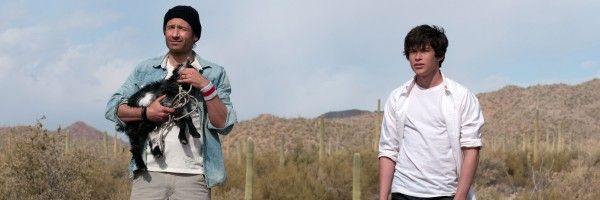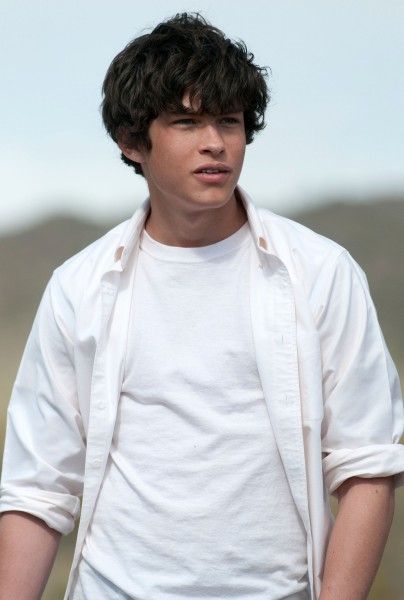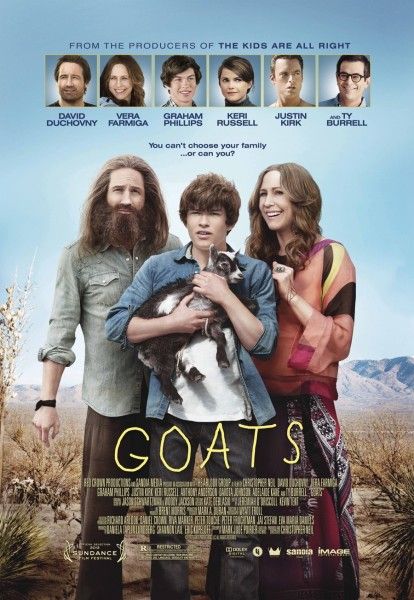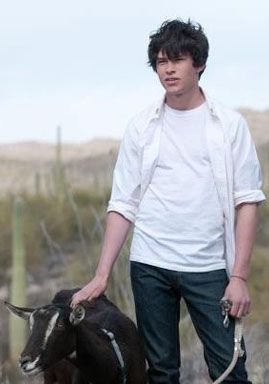The indie comedy Goats, based on Mark Poirier’s best-selling novel, tells the story of Ellis (Graham Phillips), a 15-year-old looking to find his place among his eccentric family. His mom (Vera Farmiga) is a New Age hippie that spends all of her time working on self-help rituals with her hustler boyfriend (Justin Kirk), while his dad (Ty Burrell) left home years ago and is more focused on his new wife (Keri Russell) and family. And then, there’s Goat Man (David Duchovny), the goat-herding sage who has lived in their pool house since Ellis was a child, teaching him the meaning of expanding one’s mind.
At the film’s press day, actor Graham Phillips spoke to Collider for this exclusive interview about the long road to getting this film made (including the role of Goat Man being recast with Kevin Kline, at one point), how much fun he had exploring a teenaged character with so much substance, the biggest challenges in working with the goats, what it’s been like to grow up with his character on the CBS drama series The Good Wife, why he wants to be picky about the roles he takes, and his desire to also write and direct. Check out what he had to say after the jump.
Collider: How did you come to this film?
GRAHAM PHILLIPS: I got the script and I read through it, and I fell in love with the characters in it, the story, Ellis’ struggle, and how caring and loving he was towards everyone else, even when he wasn’t getting that much care and love himself. When I got the role, I was ecstatic because it’s rare for someone my age to find a role that has substance.
Did reading the novel help? Were there layers to the character in the novel, that you brought to your performance in the film?
PHILLIPS: Having the novel was gold, for me, as an actor. My acting coach, Larry Moss, is really into doing a lot of research and homework before you shoot. He’s really into script analysis. We believe that the script is the blueprint for your performance, and when you unpack that script, you have all your character’s memories and everything you need to know, to crack the mind of your character. What the novel was, was an expanded version of the script. It was ultimately exactly what all that research would give you, if you didn’t have a novel. So, to have that novel with all those little nuances and anecdotal comments, and to literally get inside the psyche of Ellis directly, was great for me. I actually read the novel before I even had my audition with (director) Chris [Neil]. I loved it. It was such a quick read. And we were just on the same level, when I auditioned. He was a really cool guy. Over the next eight months, when financing was trying to go through, and it went from David Duchovny still being Goat Man to Kevin Kline for a weird period of time, and then back to Duchovny, there were a lot of transitions that were made. When it finally got made and the cast was greenlit, I couldn’t have been happier with who we ended up with.
Was it fun to explore and create the dynamics with each of the people in Ellis’ life, from his mother to his father to Goat Man to his fellow classmates, and get to work with each of those actors?
PHILLIPS: Yeah! It was great to work with the cast that I got to work with, on a professional level, because they’re all so talented and I learned so much from them. Beyond that, just getting to know these people as friends was terrific for me because I’m a people person. The group of people that I now can call my friends are so diverse, so cool and so down-to-earth. We had a great time sharing viewpoints and thoughts, not just about the script, but about life, in general. I had a great time.
What was it like to work with goats? Was it difficult to give them any direction?
PHILLIPS: It’s funny that you say you can’t give much direction to them. That’s totally spot on. I think that the reason why Goats is called Goats is because you can’t give direction to goats. They do what they want. That’s the point of this film. There are certain things in life that you can’t control and you can’t give direction to and you can’t change. Ellis has to learn that there are some things that you can’t change, but at the same time, it’s less about changing things and more about finding the beauty in life.
What were the biggest challenges with the goats, on set?
PHILLIPS: They didn’t seem to cooperate, ever. It was as if they could tell when we were about to actually not get the take we needed. When the sun was going down and it was the last take we could possibly do, they would somehow pull it together and come through. But, most of the time, they were totally unreliable and all over the place. In a way, that was beautiful. It kept me from being self-conscious, and it kept things light and real. Animals are the best actors. They never lie, they’re always present, and they listen. That’s a lot more than a lot of actors can say for themselves.
Working in film and television, what do you enjoy about the long-term format that TV allows, where you get to keep discovering things about a character, and what do you enjoy about telling a finite story in film?
PHILLIPS: First of all, I liked doing this film because there was so much more in the script for my character. Secondly, I think there’s something amazing about getting an entire arc, in under two hours. My character on The Good Wife is a smaller character, and his story arcs are typically season-long, unless it’s a big episode for him. His transitions take place over many, many hours. With a film like this, it takes place over an hour and a half, so it’s satisfying. You get to see months of work go by quickly. It’s great!
Have you had fun getting to grow up with the character that you get to play on The Good Wife?
PHILLIPS: Yeah. I like my character on The Good Wife. I’ve grown a lot, as an actor, while doing The Good Wife, in part because I’ve learned a lot from Julianna [Margulies] and all the different directors that I’ve worked with. But also, I’m just growing up and my character is growing up with me. That’s fun for me, to watch my character parallel myself. Zach seems to be getting more and more comfortable in his own shoes, in comparison to the fidgety, dorky kid in the first season. I’m not going to say that I was exactly like that, but I definitely feel more comfortable in my own shoes now than I did four years ago. That’s a very common phenomenon for someone in their teenage years. That’s also what my character went through in Goats.
When you work with such a high caliber of talent, in front of and behind the camera, does that make you more picky about what you want to do, in the future?
PHILLIPS: Yeah. I’d like to say that, for the rest of my career, I’m going to be pretty picky. The only reason why you should do a film is because it creatively carbonates you and gets you going. If you’re doing it for any other reason, you’ve lost sight of why you’re acting, in the first place. At the same time, sadly, there’s a lot of politics that goes into choosing roles. Sometimes you have to do a role that might not be the most interesting, but it will set you up for doing roles that you want to do. I’ve been very lucky to have done such quality films and TV show work. It would be hard for me to go to something lesser. But honestly, I’m just honored to be working. I’m still learning and finding out about myself. That’s rare. Not a lot of people get that, and I definitely don’t take it for granted.
Do you look up to someone like David Duchovny, who has had a varied career with interesting characters, and who is also a writer and director now, too?
PHILLIPS: Yeah. It’s funny because we both did a TV show when we were young, he went to Princeton and I’m going to Princeton, we both want to write and direct, and maybe more so do that than act. We’re similar, in more than one way. I don’t know where my career is going to lead me. I would like my career to be as diverse as possible. I’ve done theater and I’ve done music, and I would love to keep that in my life. I really respect people who, while they only do films, they have a wide repertoire and a wide thematic array of films they do. I loved Heath Ledger’s career. I think it was such a tragedy, what happened, because I think that he was going to have one of the most interesting careers out there. I loved how diverse he was, and I would love to do something along those lines.
Have you always been so focused on the bigger picture, and known that you wanted to balance school and career?
PHILLIPS: No, I’d say it happened a few years ago. That’s when I really started thinking about what I wanted to do in life, in general. That’s when people start thinking about their jobs and their life plan, anyways. This is my job and it goes hand-in-hand with my long-term plans. Maybe I don’t continue acting. Maybe I don’t get to direct, as much as I want to. You really never know. But, as of right now, I’m really enjoying it. As far as I can tell, I’d love to keep it up and ride the wave while I can, to avoid law school, I suppose.




